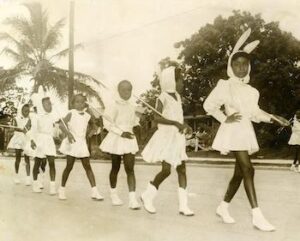
Dunbar, Florida
*Black history and Easter Sunday are affirmed on this date in 0189 AD. The Easter holiday is a special time for Christians globally, but for Black people, it's also a time with deep connections to Black history. Here are a few interesting facts about these connections.
Easter's Origins: While Easter is a mashup of Jewish and pagan practices, it was a Black Pope bishop, Pope Victor I, who created Resurrection Sunday. Victor I standardized the practice of celebrity, but he also made another part of it happen.
Dressing Up: Saint Victor, I also created the tradition of wearing unique outfits for Easter. Victor I mandated that newly baptized Christians wear all-white linen garments during this time. Eventually, the practice evolved into dressing in one's best clothes to attend Easter services.
The Easter Speech: Rooted in Black tradition, the Easter speech instructs Black children to be excellent orators and public speakers. People like Oprah Winfrey and Martin Luther King Jr. learned how to speak comfortably to an audience by reciting speeches in front of the congregation on Easter Sunday. During the reign of the fifteenth pope, Saint Victor I, Easter celebrations were celebrated on a Sunday. Victor was a native of northern Africa and served as pope from 189 to 199 A.D. He was the first African bishop, followed by only two others: Saint Miltiades, who served as the 32nd from 311 to 314 A.D., and Saint Gelasius I, who was the 49th from 492 to 496 A.D.
More notably, roughly 100 years after Pope Victor I's declaration of when Easter was to be celebrated, we can trace a widespread tradition back to that period: the new outfit for Easter Sunday: "In the early days of Christianity, newly baptized Christians wore white linen robes at Easter to symbolize rebirth and new life. But it was not until 300 A.D. that wearing new clothes became an official decree, as the Roman emperor Constantine declared that his court must wear the finest new clothing on Easter. Eventually, the tradition came to mark the end of Lent, when, after wearing weeks of the same clothes, worshipers discarded the old frocks for new ones."
Centuries later, popular superstitions furthered the tradition. A 15th-century proverb from Poor Robin's Almanac stated that if one's clothes on Easter were not new, one would have bad luck: 'At Easter let your clothes be new; Or else for sure you will rue it.' In the 16th Century, during the Tudor reign, many believed that unless a person wore new garments at Easter, moths would eat the old ones, and evil crows would nest around their homes." In the United States, modern Easter traditions were not celebrated until after the American Civil War; "After the devastation of the war, however, the churches saw Easter as a source of hope for Americans. Easter was called 'The Sunday of Joy,' and women traded the dark mourning colors for the happier colors of spring."
Americans often think about the Easter holiday as a spectacular festival with all our senses being dazzled by floral arrangements, children reciting Easter poems, and decorations with colors marking the arrival of springtime; there is a sadder side to Easter in the Black Christian experience in America. On Easter Sunday, 1873, one of the largest and bloodiest racist attacks in United States history took place in Colfax, Louisiana. After a disputed election in which they had almost won a majority of the votes, local black Republican candidates had attempted a peaceful occupation of the Grant Parish courthouse.
Another well-known Easter song is "He Arose from the Dead." The legendary Texas blues musician Blind Lemon Jefferson wrote this song in 1927 under the pseudonym Deacon L. J. Bates. Another example of a Black celebration of Easter seen in the movie The Color Purple is where Shug Avery (character) and a blues band leave the juke joint deep in the woods and walk shamelessly into the nearby church, singing, "God is trying to tell you something." African American Easter traditions are an essential part of Black cultural heritage. From Easter fashion to Easter dinner to Easter Sunday church traditions, these traditions reflect history, faith, and creativity. https://www.dunbarfestival.org/
In 1946, Black Floridians created the Dunbar Easter Parade, which has become a pivotal event for the Dunbar community. The parade is an annual tradition for many families in the Dunbar community and was started by Evelyn Sams Canady, a former educator at the Williams Academy, and Sara Richardson.